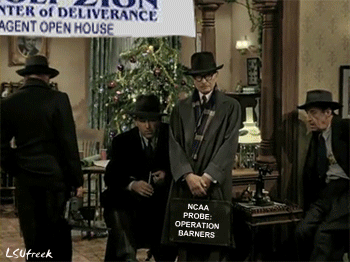November 5th, 2010 at 3:30 PM ^
AWESOME!! (need bigger caps)
November 5th, 2010 at 3:46 PM ^
AWESOME!!
November 5th, 2010 at 11:26 PM ^
is this what passes as funny now?
November 5th, 2010 at 3:38 PM ^
LSUFreek makes some of the funniest gifs out there.
November 5th, 2010 at 3:36 PM ^
Urban running up behind Chizik in the second one with a small basket...just brilliant.
November 5th, 2010 at 3:38 PM ^
LSU Freek's take on RichRod last year was beyond epic.
November 5th, 2010 at 3:38 PM ^
I think LSUfreek is a genius.
November 5th, 2010 at 3:44 PM ^
Now that TSB is down....
November 5th, 2010 at 4:23 PM ^
EDSBS
November 5th, 2010 at 3:45 PM ^
Love the laptop in Cam's arms.
November 5th, 2010 at 3:47 PM ^
Both are great in their own right, I wish I was able to do what he can do.
November 5th, 2010 at 4:08 PM ^
Just great stuff. +1 internet for LSUFreak.
November 5th, 2010 at 4:48 PM ^
At the risk of inserting a serious comment in the middle of a humorous thread, I had something of a question about the Newton situation.
For what I've read, there is no indication that Newton was actually involved in this. All the evidence (which I believe is based entirely on statements made by Mississippi State officials, not anyone from Auburn) says that some guy offered Miss State Newton in exchange for money. Is there any indication at this point that Newton or his father were involved? As opposed to this agent trying to get money for a player he couldn't actually get?
I'm not criticizing the making-fun-of-Newton thread, just curious if more information has come out.
November 5th, 2010 at 5:27 PM ^
...indications that something is amiss. Newton's comments that his decided he'd be going to Auburn instead of to Mississippi State where his former UF OC is the HC. The fact that one of his dad's churches was being targeted to be razed because of code violations and then suddenly funds were identified to refurbish it.
Bottom line: smoke indicating fire, but maybe signifying nothing at all.
November 5th, 2010 at 6:47 PM ^
I'm just wondering out loud with this question, but humor me for a moment... If money wasn't given directly to either Newton or his father, but rather to a recognized 501(c)(3) that Newton's father just happens to run (I'm making the assumption that the church was a recognized 501(c)(3), of course, but even if it's not, just assume that it is for the hypothetical), is that actually a violation? In other words, if someone donates to a charity, and that charity happens to have ties to an athlete, is that a violation?
November 5th, 2010 at 9:00 PM ^
...it's a violation. Bylaws 16 and 12 are pertinent. They make no exception for charities. Athletes are not allowed to accept any compensation nor are any individuals or agencies allowed to accept any compensation on the athlete's behalf.
November 5th, 2010 at 11:19 PM ^
nor are any individuals or agencies allowed to accept any compensation on the athlete's behalf.
Well, that's kind of what I'm getting at. What does it mean to be "on the athlete's behalf" and is a charity an "individual or agency"? I'm sure it's just the lawyer in me coming out, but those are terms that have specific meaning. I would think if the type of transaction that I'm describing (i.e. payment directly to a charity connected to the family of an athlete) is a violation then every single member of that congregation that is an Auburn fan (and given the nature of that part of Georgia, it'd be a good percentage of them) could potentially be causing a violation. I think we can all agree that contributions by members of the church would not cause this problem. In this case, we know it's a charity that doesn't have much money, but what would prevent someone from outside of the church who has money "joining the church" and contributing a large sum of money, which as a church member, should be perfectly legitimate. I realize that this is quite far off into "hypothetical land", but I'm just trying to gauge the parameters of how these bylaws would actually, and practically, apply. I actually don't think this is all that far-fetched either, though. We counsel a lot of non-profits and I can definitely tell you from experience that a good many non-profits receive large contributions for all kinds of reasons and from all kinds of sources and it seems to me that it would be awfully difficult, if the money were paid to the chairty (again, just hypothetical), to attribute anything other than a charitable purpsoe for the contribution. Basically, what I'm getting at, is that this scenario seems like an awfully murky area where calling it a violation would not be as clear cut as the bylaw itself makes it sound.
November 5th, 2010 at 11:38 PM ^
a guy could buy a Ferrari for a player's best friend as a "gift" for the non-player and the NCAA would likely find sufficient proof
November 6th, 2010 at 12:11 AM ^
I would guess that if it looks like a quid pro quo, that is enough. It is kind of like prostitution. You can give a person money, and you can have sex with a person, you just can't give them money so that they will have sex with you. Similarly, a person can give money to a charity associated with an athlete's family, and the athlete can commit to a person's school, but if it appears that the donation was given to influence the athlete's decision, then you could be in trouble. Obviously, the more degrees of separation there are between the athlete and the donation (the better the money is laundered), the harder it will be to prove intent to influence. I would imagine that the timing of the donation, length of time as member of the church, and other circumstantial evidence could affect the decision.
Since you work with non-profits, I have a question for you. Since contributions to 501(c)(3) organizations are only deductible to the extent that there are not goods received in return, could the donor or the church get in trouble if it is determined that the donation was actually payment for Newton's commitment?
November 7th, 2010 at 8:09 AM ^
I agree with what you're saying, it's all about the degree. I was just more or less taking this topic and running with it a little bit because it seems like there is some wiggle room within the rule on situations like this.
To your question, in my hypothetical, I suppose that would depend on whether the contributor actually deducted the contribution.
November 8th, 2010 at 1:36 PM ^
...wiggle room. See the definitions of pay and benefits and how they are prohibited if not expressly allowed. There is nothing in the D-I Manual that allows payments to charities.
12.1.2 Amateur Status. An individual loses amateur status and thus shall not be eligible for intercollegiate competition in a particular sport if the individual:
(a) Uses his or her athletics skill (directly or indirectly) for pay in any form in that sport;
(b) Accepts a promise of pay even if such pay is to be received following completion of intercollegiate athletics participation;
12.1.2.1 Prohibited Forms of Pay. “Pay,” as used in Bylaw 12.1.2 above, includes, but is not limited to, the following:
12.1.2.1.1 Salary, Gratuity or Compensation. Any direct or indirect salary, gratuity or comparable compensation.
12.1.2.1.4 Expenses, Awards and Benefits. Excessive or improper expenses, awards and benefits (see Bylaw 16 regarding permissible awards, benefits and expenses to enrolled student-athletes).
12.1.2.1.4.1 Cash or Equivalent Award. Cash, or the equivalent thereof (e.g., trust fund), as an award for participation in competition at any time, even if such an award is permitted under the rules governing an amateur, noncollegiate event in which the individual is participating. An award or a cash prize that an individual could not receive under NCAA legislation may not be forwarded in the individual’s name to a different individual or agency. (Revised: 4/25/02 effective 8/1/02)
12.1.2.1.6 Preferential Treatment, Benefits or Services. Preferential treatment, benefits or services because of the individual’s athletics reputation or skill or pay-back potential as a professional athlete, unless such treatment, benefits or services are specifically permitted under NCAA legislation. For violations of this bylaw in which the value of the benefit is $100 or less, the eligibility of the individual shall not be affected, conditioned on the individual repaying the value of the benefit to a charity of his or her choice. The individual, however, shall remain ineligible from the time the institution has knowledge of the receipt of the benefit until the individual repays the benefit. If the violation involves institutional responsibility, it remains an institutional violation per Constitution 2.8.1, and documentation of the individual’s repayment shall be forwarded to the enforcement staff. (Revised: 1/11/94, 1/14/08)
16.02 DEFINITIONS AND APPLICATIONS
16.02.3 Extra Benefit. An extra benefit is any special arrangement by an institutional employee or a representative of the institution’s athletics interests to provide a student-athlete or the student-athlete’s relative or friend a benefit not expressly authorized by NCAA legislation. Receipt of a benefit by student-athletes or their relatives or friends is not a violation of NCAA legislation if it is demonstrated that the same benefit is generally available to the institution’s students or their relatives or friends or to a particular segment of the student body (e.g., international students, minority students) determined on a basis unrelated to athletics ability. (Revised: 1/10/91)
16.02.4 Pay. Pay is the receipt of funds, awards or benefits not permitted by governing legislation of the Association for participation in athletics. (See Bylaw 12.1.2.1 for explanation of forms of pay prohibited under the Association’s amateur-status regulations.)
November 10th, 2010 at 6:00 PM ^
I disagree that the wording there doesn't leave wiggle room for the situation that I described. The rules talk about the benefit received by the athlete or the athlete's family. Sure, if the player's father works with the charity, there is a possible incidental benefit to the athlete's family (in that, theoretically, the benefit conferred to the charity would trickle down to the player's family through salary paid by the charity to the employee). The situations described in the rule seem to be designed for the situation where School A or Booster X pays Player B or Family Member C directly, but does not address the situation where School A or Booster X pays Charity D who pays Family Member C particularly well. The portion that you bolded regarding express authorization, I think, proves this point well. The key words in that are that the benefit is made to provide the student-athlete or the student-athlete's relative or freind a benefit. In the situation that I describe, the benefit is not being made ot the student-athlete or the student-athlete's relative or friend. It's made to a charity. Allowing that would actually make sense, since a rule that deems that type of transaction to be against NCAA rules would likely impact any player who has a family member who works for a charity, since any contribution to the charity by the athletic department would run afowl of the rule. Essentially, it would effectively prohibit athletic departments, schools, or really, anyone with an attachment to the school, from contributing to a charity out of fear that their contribution could be construed as an extra benefit under that rule. It just seems like once you get past the direct transaction type situation (i.e. School A or Booster X pays Athlete B or Family Member C) and to the diffused transaction type situation (i.e. School A or Booster X pays Charity D who pays Family Member C) it would get far too difficult to make a causal connection without attacking charitable giving. Again, this is all hypothetical, but given the rules that you've provided, it seems far from a concrete prohibition.
November 5th, 2010 at 6:12 PM ^
Just awesome. Someone needs to send this to Chizik's office. Also, I think the NCAA infractions committee would also get a kick out of it.
November 5th, 2010 at 8:41 PM ^
Everytime a bell rings a helmet gets its wings.
November 8th, 2010 at 1:09 PM ^
priceless


